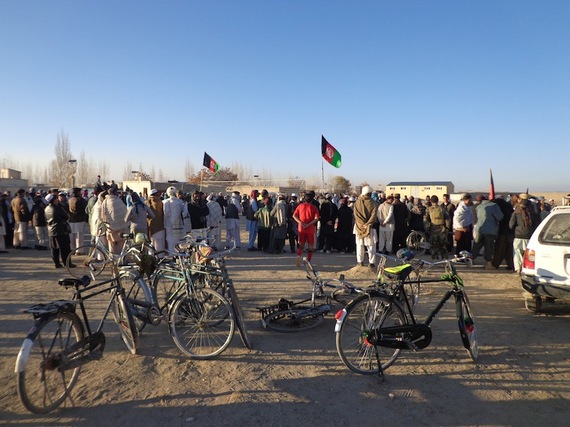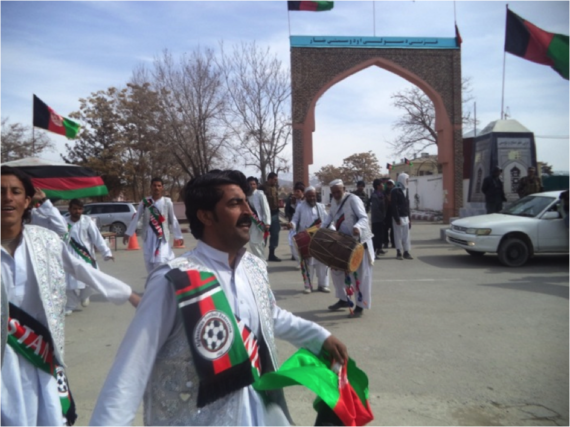On November 23rd, a (probably) Taliban suicide attacker targeted a local inter-district volleyball tournament in southeastern Paktika province, Afghanistan. At least 45 people were killed during the explosion and many of the 20+ who were injured died at a nearby hospital. This attack is a horrifying example of the Taliban's callous disregard for the value of human life, and should be denounced by people of every creed and political stance. As usual when the Taliban intentionally kill innocent civilians, their spokesman Mssr. Zabihullah Mujahid has so far refused to take responsibility for the attack, leaving an air of "mystery" about the incident that would be laughable under other circumstances. Contemptible as this sort of hypocrisy may be, the lack of surprise or any other notable response to this news in America also lies heavily on my heart.
Don't get me wrong; I understand why no one in the United States cares anymore. Americans are tired of news of violence from Afghanistan, and have come to expect this sort of thing. Few of us are still paying attention to events in Kabul, and fewer still know enough about the conflict to see this attack for what it is; a departure from a policy of relative restraint vis-à-vis local sporting events in rural southeastern Afghanistan over the last few years.
What people in America ought to know is that even in very dangerous areas in Afghanistan's southeast, local communities enjoy gathering to watch games of soccer, volleyball, and cricket. Behind this forgettable headline of "yet another" attack in Afghanistan is a more interesting reality: southeastern Pashtun tribes love sports and have been quietly making a public space for sporting events in areas where the Taliban still routinely fight for control with government forces. Instead of being bored by the commonplace news of a violent attack by the Taliban, we should be outraged at the erosion of one of the few social freedoms that was starting to be somewhat widely enjoyed in rural communities of the southeast.
Public life in rural southeastern Afghanistan has gone through several dramatic cycles of change in the last two decades. The wanton banditry and violence of the civil war in the 1990s were followed by a period of Taliban rule in which many formerly common public traditions were widely banned. Religious festivals had historically included large dance and music performances in Paktika and neighboring Ghazni province. Weddings often involved music and elaborately costumed dancers. Old silk embroideries that I found in antique shops when I worked in Kabul offered a tiny window into a past when local men in brightly decorated dance uniforms performed publicly for their communities in Gelan and other areas that are now extremely dangerous.
Most Muslims from this area are from a religious tradition that is not fundamentally opposed to music and dance per se. The Taliban tried to change all of that with strict regulations surrounding weddings and holiday celebrations in the late 1990s. There was an increase in some social freedoms in the region after the Taliban regime fell in 2001, but these short-lived liberties again disappeared with the rising tide of violence in 2006. Many communities were either coerced by the Taliban into banning these parts of public life, or voluntarily ended the sporting events and celebrations that had only so recently been revived.
For various reasons, from 2012-2014, in parts of Ghazni and Loya Paktya, sporting events and dance again began to find a place in public life. This was due partly to increased security around district centers, and partly to the rise in prominence of some local Taliban commanders who were less inimical than Pakistani or Kandahari Taliban to public events like volleyball, soccer, and cricket matches. Attacks like this are usually perpetrated for one of two reasons: either as an assassination attempt against a major figure present at the sporting event, or as an attempt to frighten the community into complying with a Taliban. With the rise of the Afghan Local Police (ALP), by 2013 many local Taliban leaders in the southeast may have been wary of further alienating local communities by cracking down on popular traditions. This could easily have led to a rise in ALP recruitment, which terrified the Taliban.
Whatever the reasons for this change, Eid celebrations began to include dancing, while large public volleyball tournaments and bouts of a jousting-like sport called Naiza Bazi again became common in some areas. Now we are all left to wonder whether this attack on a volleyball tourney in Paktika was a one off, or if it might not signal a strategic shift as the Taliban attempt to again clamp down on the small bit of public freedom that locals have enjoyed by organizing and competing in sporting events.
Who knows what the future will hold for Afghanistan? Unlike many observers, I'm relatively confident that in the long term, the prospects for peace are fairly good. Young people in Paktika, Ghazni and the rest of the southeast are aware of the value of education, and where it is economically feasible, they seem to prefer university, cricket, and volleyball to extremist politics. Unfortunately, it is difficult to be sanguine about the short term. No matter what happens, for at least a few months, locals in southeastern Afghanistan will be likely to think twice before getting together for a friendly game of volleyball or soccer.
What had begun to seem like the beginning of a more open time for community centered events in the region may soon be thought of wistfully as little more than a brief respite before a return to the "normal" of brutal intimidation, suicide attacks and crocodile tears from Mssrs. Zabihullah Mujahid, Mullah Omar and company. This would be a terrible shame, but Americans should not mistake this kind of attack on a sporting event for more "business as usual." As the years have shown, people in the southeast of Afghanistan are very adaptable. If they could have even a little more space and time for peace, their communities could begin to remake themselves amid the wreckage of these decades of war.

